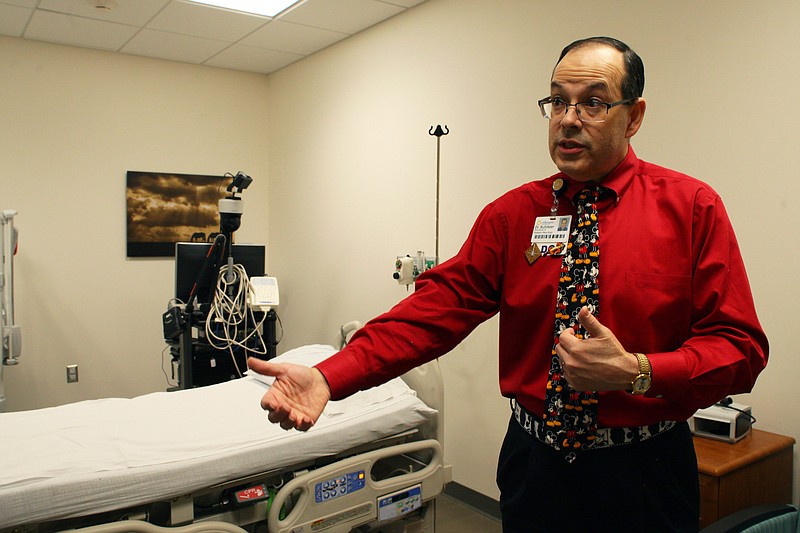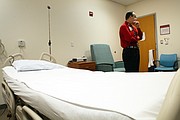A total of 620 children will have undergone sleep studies at the Children's Hospital at Erlanger by the end of 2019.
Before Dr. David Suhrbier, Erlanger's chief of pediatric neurology, joined the hospital in 2015, those children would have had to travel to Atlanta or another city for the service, which the American Academy of Pediatrics calls the standard of care to evaluate a child for a sleep breathing disorder if they snore.
"Snoring is not a normal phenomenon for children," Suhrbier said. "It is something that can disrupt their sleep, which leads to chronic sleep deprivation. It may also be the symptom that alerts you to an underlying sleep disorder breathing problem, and so we're looking for obstructive sleep apnea."
Untreated, obstructive sleep apnea can result in serious health problems, such as insulin resistance, diabetes, hypertension and heart failure. More commonly in children, he said it will cause behavioral disturbances.
"It will produce symptoms that are often mistaken for attention deficit hyperactivity disorder, or they will have difficulties with memory, they'll have difficulties with academics, they'll be more irritable and may be involved with more behavioral problems," he said.
Suhrbier is one of five pediatric neurologists - one of the most requested services at the Children's Hospital at Erlanger - at the only children's hospital within 100 miles. He's also one of 50 other pediatric providers who've joined the hospital in the last five years as part of an effort to revolutionize children's health care in the region.
Don Mueller, CEO of Children's Hospital at Erlanger, said the hospital's new Kennedy Outpatient Center - which opened a year ago this month - helped demonstrate the vision and community support needed to recruit those providers. The project was the first step in Erlanger's long-term plan to build a new, comprehensive children's hospital, upgrading emergency and inpatient services at the main campus across the street.
"You can go to a well-established hospital program and be one of 25 doctors, or you can come here and be part of a dream," Mueller said.
The children's hospital dream was also shared by Erlanger Health System's former CEO Kevin Spiegel, who said pediatrics would become Erlanger's "signature department" when he took the helm in 2013. One of the first things Spiegel did after he was hired was tour the T.C. Thompson Children's Hospital and decide that the roughly 40-year-old building on Erlanger's main campus needed to be replaced - especially considering the mean age of U.S. children's hospitals is 6 years.
Spiegel hired veteran hospital designer Bruce Komiske as vice president of new hospital design and construction to lead the project. Many called Spiegel's plan crazy at the time. Erlanger was in financial turmoil. Then, the hospital turned its $36 million loss from 2008 to 2013 into a $37.3 million profit for fiscal year 2015.
In 2017, Erlanger launched the "Believe" campaign, which Julie Taylor, president of Erlanger Health System Foundations, called the largest philanthropic campaign in Chattanooga history.
More than 6,000 individuals contributed more than $30 million - exceeding the $28.5 million initial fundraising goal - for the first phase. Over half of Erlanger's employees were among the donors.
Erlanger was able to commit $11.5 million of hospital funds, and the new $40 million, 90,000-square-foot Kennedy Outpatient Center opened in December 2018. The facility promised to increase Erlanger's capacity to see patients, improve efficiency and expand its multidisciplinary clinics so that complex care patients could see all their providers in one visit. After one year, Mueller said it's exceeded those expectations.
"We were really focused on becoming very efficient and reducing the cost of health care," he said. "Previously, everybody had their own space, and the problem with that is if it's Wednesday and my orthopedic surgeons are in surgery, no one's going to have those rooms by sharing space in the building, we actually picked up 30% more utilization."
Before the new outpatient center opened, Mueller said the average wait time for an appointment across all sub-specialties was 65 days. Now, on average, the number of days spent waiting is in the low 20s, and over half of appointments to see a pediatric specialist now happen within 14 days.
"Some areas are much higher. For instance, neurology has an insatiable demand, so their wait times are much longer, and they work in patients that need to get in on an urgent basis. But for cardiology and orthopedics, you can get in almost on the same or next day," he said, adding that other accomplishments from year one include:
- More than 60,000 outpatient visits during the first year of operation.
- Recently awarded American Academy of Sleep Medicine Pediatric Center certification for the pediatric sleep center, located in the outpatient center.
- Opened the "Smoke B Gone" clinic to deal specifically with vaping and addiction.
- New home of the Neonatal Intensive Care Unit follow-up clinic.
- Four tele-health rooms allowing sub-specialists to see children from around the region.
- Home of the region's only EOS multidimensional X-ray machine, which offers low dose 3D images, primarily used for standing images of spinal cases.
- Expanded the craniofacial multidisciplinary clinic.
- Opened the region's first aero-digestive multidisciplinary clinic.
Mueller said the sleep center is one of the largest growth areas in the pediatric centers, and its recent certification is a major point of pride for the hospital. Suhrbier said the designation is the result of the staff's hard work and dedication.
"We can say to families, 'You can bring your children here, and you're going to get the kind of high quality medicine that you deserve and that you're looking for for your child,'" he said, adding that it's a benefit to the entire hospital, especially as the understanding of sleep's impact on health grows.
"All of my colleagues have patient populations that could benefit from having access to sleep medicine and ways to diagnose patients who have sleep problems," he said.
In the coming year, Mueller said Erlanger plans to open a multidisciplinary maternal, fetal clinic to allow specialty intervention before a baby is born. It is also working to establish new pediatric outreach centers in Cleveland and Dalton.
Perhaps most importantly, he said, is completing the final stages of the campaign to raise funds for a pediatric MRI machine and three surgical suites in the outpatient center, which will signal the completion of phase one of the new children's hospital.
"The biggest challenge is meeting the need for pediatric MRIs here in town. The wait for non-urgent pediatric MRI appointments has occasionally been longer than two months," he said. "My hope is that the community will continue to respond and help us generate the funds."
Mueller said he doesn't have a timeline for when phase two will begin, but the project is still underway despite a change in leadership. Spiegel and Komiske are no longer with the health system.
Taylor said in an emailed statement that the foundation board members and Erlanger's development department "are working closely with Erlanger's executive leadership to determine a timeline for planning the next growth phase."
Steven Wagner, Erlanger's executive director of development, said not-for-profit hospitals rely on philanthropy to maintain and expand services.
"Most businesses operate off the principle that every service is provided in return for a fee, but non-profit hospitals provide services without the guarantee of 100% of the cost being covered," Wagner said in an email.
He said the challenge is greater for pediatric hospital systems, since they provide complex care to a large number of Medicaid patients.
"When more than half your patient population costs you money instead of makes you money, you require an additional source of available revenue/capital investment," he said. "This is where philanthropy drives future possibilities."
Contact Elizabeth Fite at efite@timesfreepress.com or 423-757-6673.

